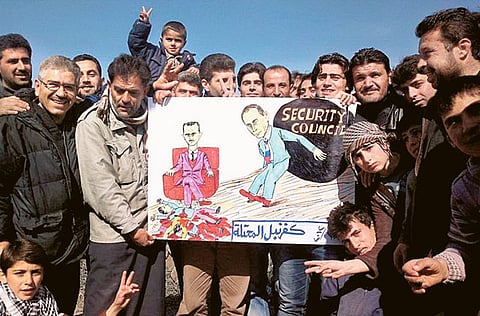Putin has misread Syria situation
Russia's use of its UN veto, in opposition to Arab League demand, has turned the tables in Middle East

If anyone thinks the international opprobrium heaped on Russia and China for vetoing the UN resolution condemning Syria's violent repression of its people is unusual, they should cast their minds back to July 13, 2006.
Former US president George W. Bush and former UK prime minister Tony Blair spent the best part of the following 33 days dismissing calls for an end to Israel's bombardment of southern Lebanon in response to a cross-border raid by Hezbollah.
On August 3, Sir Rodric Braith-waite, a former British ambassador to Moscow, wrote that Blair's premiership had descended into "scandal and incoherence". Nor were serving Foreign Office officials quick to leap to Blair's defence. The government's policy of resisting calls for a ceasefire was "driven by the prime minister alone", they said.
Such a position is today occupied by Vladimir Putin, Russia's prime minister and next president who, on the day tens of thousands of his countrymen turned out in temperatures of -18 degrees Celsius to shout slogans like ‘Russia without Putin', ordered Russia's envoy to the UN to wield the veto. Russia's public relations machine went into overdrive.
Foreign Minister Sergei Lavrov gave three reasons: the drive for a crackdown on Syria was preparation for a ‘Libyan scenario'; despite efforts to tone it down, the draft was unilateral, and did not set enough demands on anti-government armed groups; and it demanded the withdrawal of President Bashar Al Assad's forces from towns and cities.
"This phrase, without being linked to a simultaneous termination of violence on the part of armed extremist groups, is absolutely provocative, as no president with self-respect, no matter how treated, will agree to surrender inhabited localities to armed extremists without resistance," Lavrov said. Insurrections in the Middle East have now turned the international tables full circle.
Whereas western powers supported the status quo of Israel surrounded by Arab autocrats with whom it had made peace, and Russia had maintained diplomatic and defence links with Syria and Iran which backed the ‘resistance' movements to Israel, today Russia finds itself defending the autocratic status quo in the form of Al Assad.
Staunching bloodshed
Putin, backed by the siloviki who run the military and have invested billions in Syria, may think his policy on Al Assad is good tactics. It stops an intervention that the West was never going to make. But it makes for terrible strategy.
The veto sets Russia on the opposite side of the table from the Arab League; it lifts the international responsibility for failing to staunch the bloodshed off US President Barack Obama's shoulders, and assumes that burden itself.
And if defecting Syrian soldiers are to be called ‘armed extremist groups', who exactly are the militias currently running Libya, whom Russia belatedly recognised as a legitimate authority? If Islamists are by their nature extremist, and in Putin's eyes they are, what does that make the elected transitional authority in Tunisia?
Lavrov and the foreign intelligence service chief Mikhail Fradkov were in Damascus yesterday to ‘stabilise' the situation in Syria and persuade Al Assad to implement ‘democratic transformations'.
In so doing, Russia will attempt to persuade the Arab League to extend the mission of Arab observers in Syria — a policy it has already abandoned. This lacks any sense of reality.
Russia is simply following in Turkey's footsteps, months after Prime Minister Recep Tayyip Erdogan tried and failed to get Al Assad to institute political reforms before it was too late.
It is now too late. If Putin continues to believe that the extraordinary domestic protest he is facing has all been staged by the US State Department, there is little chance of him seeing the turmoil in Syria differently.
Putin's deadly enemy is the isolation in which he lives.
David Hearst is a foreign leader writer for the Guardian and a former Moscow correspondent.


